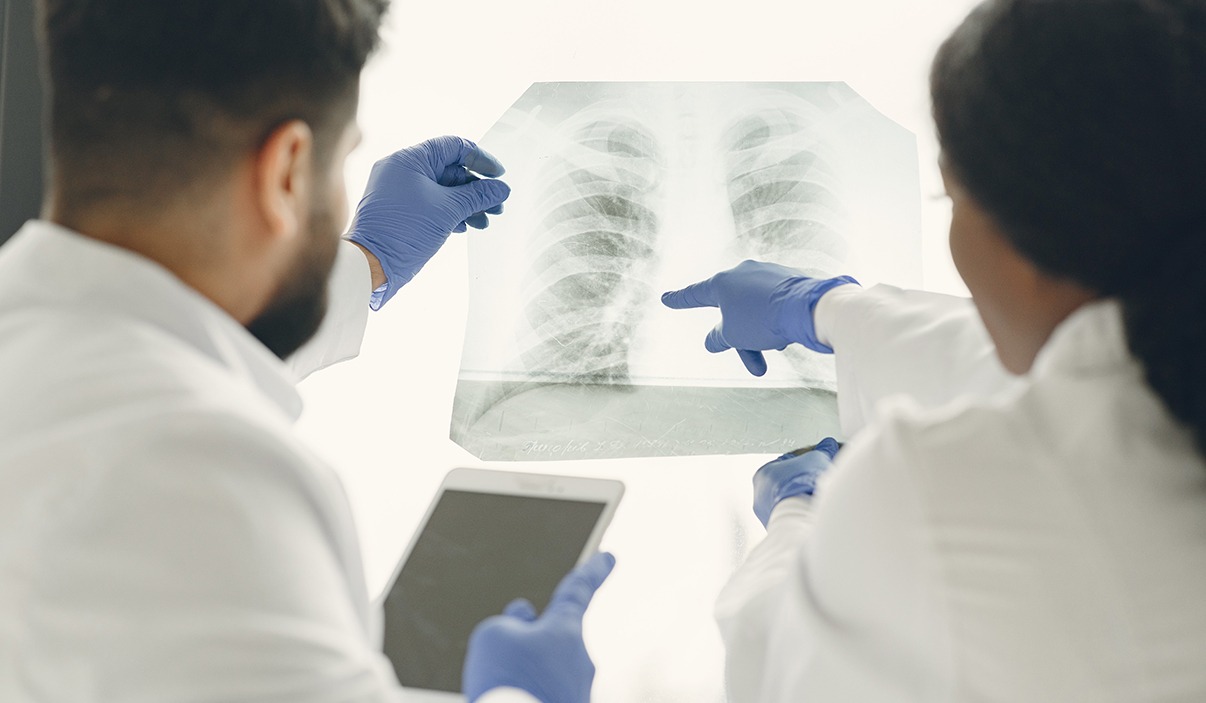- +91 8921713940
- 3rd Floor, Mamson Prime, Kunnumpuram, Edappally, Ernakulam
ILD Clinic
- Home
- ILD Clinic
ILD Clinic
The ILD Clinic at Apex Pulmonology provides specialized, comprehensive care for individuals suffering from Interstitial Lung Diseases (ILD), a group of disorders characterized by inflammation and scarring of the lung tissue. These conditions can lead to significant respiratory difficulties and affect overall lung function. Our clinic is equipped with a multidisciplinary team of experts, including pulmonologists, radiologists, and pathologists, who collaborate to deliver the highest standard of care. Utilizing advanced diagnostic tools, such as high-resolution computed tomography (HRCT) scans, lung biopsies, and pulmonary function tests, we are able to accurately identify the specific subtype of ILD affecting each patient. This precise diagnosis is crucial for developing effective, personalized treatment plans tailored to the unique needs of each individual.
Our focus extends beyond diagnosis to include comprehensive disease management and symptom relief. We employ a range of cutting-edge therapies and interventions designed to address the specific challenges of ILD. These may include medications to manage inflammation and fibrosis, oxygen therapy for advanced cases, and pulmonary rehabilitation to enhance lung function and physical fitness. Our goal is to optimize lung health, alleviate symptoms, and improve overall quality of life for our patients. Through ongoing monitoring and adjustments to treatment plans, we ensure that each patient receives the best possible care and support throughout their journey with ILD.
Symptoms of ILD
Recognizing the early signs of ILD is crucial for timely diagnosis and treatment. Common symptoms include:
- Persistent dry cough: A chronic cough that doesn’t produce mucus.
- Shortness of breath: Particularly noticeable during physical activities.
- Fatigue: A general feeling of tiredness or lack of energy.
- Chest discomfort: A feeling of tightness or pain in the chest.
- Unexplained weight loss: Occurring as the disease progresses.
- Clubbing of fingers: A condition where the tips of the fingers enlarge.
Causes and Risk Factors of ILD
The causes of ILD can vary, and in many cases, the exact cause is unknown (idiopathic). However, some common factors include:
- Autoimmune Disorders: Diseases like rheumatoid arthritis, lupus, or scleroderma.
- Environmental and Occupational Exposures: Long-term exposure to harmful substances like asbestos, silica, mold, or animal droppings.
- Smoking: A major risk factor for some forms of ILD.
- Certain Medications: Chemotherapy drugs, antibiotics, or anti-inflammatory drugs.
- Genetic Predisposition: A family history of ILD increases risk.
Preventing ILD Progression
- Avoid exposure to harmful substances like dust, chemicals, and pollutants.
- Quit smoking and avoid secondhand smoke.
- Maintain a healthy weight and engage in regular physical activity.
- Get vaccinated against respiratory infections like influenza and pneumonia.
Expert Diagnosis and Advanced Testing
Our multidisciplinary team of pulmonologists, radiologists, and pathologists work collaboratively to accurately diagnose various ILD subtypes. We utilize a range of advanced diagnostic tools and techniques, including high-resolution computed tomography (HRCT) scans, lung biopsies, and pulmonary function tests, to obtain a detailed understanding of your lung condition. Accurate diagnosis is essential for determining the most effective treatment approach and managing disease progression.
Personalized Treatment Plans
Once a diagnosis is established, our team develops personalized treatment plans tailored to each patient’s specific needs. Treatment strategies may include:
- Medications: We prescribe a range of medications, including anti-inflammatory drugs, immunosuppressants, and antifibrotic agents, to manage inflammation, slow disease progression, and alleviate symptoms.
- Oxygen Therapy: For patients with advanced ILD, supplemental oxygen therapy may be recommended to improve oxygen levels and support better breathing.
- Pulmonary Rehabilitation: Our program includes customized exercise and education plans to enhance lung function, improve physical fitness, and help patients manage their symptoms effectively.
- Lifestyle and Supportive Care: We provide guidance on lifestyle modifications and supportive care to help patients cope with the physical and emotional challenges of living with ILD.
Comprehensive Disease Management
Managing ILD requires a holistic approach that addresses not only the disease itself but also its impact on the patient’s quality of life. Our team is committed to ongoing monitoring and adjusting treatment plans based on disease progression and patient feedback. Regular follow-ups and evaluations ensure that treatment remains effective and that any emerging issues are promptly addressed.
Patient-Centered Care
At the ILD Clinic, we prioritize a patient-centered approach, focusing on compassionate care and individualized support. We understand that living with ILD can be challenging, and we are dedicated to providing a supportive environment where patients feel heard, understood, and cared for. Our goal is to help you achieve the best possible outcomes and maintain a good quality of life.
Why Choose Our ILD Clinic?
- Expert Team: Our clinic is staffed with specialists who have extensive experience in diagnosing and treating Interstitial Lung Diseases (ILD).
- Advanced Technology: We use the latest diagnostic tools and therapies to provide precise and effective care.
- Comprehensive Services: From diagnosis to treatment and ongoing management, we offer a full range of services to meet your needs.
- Compassionate Care: We are committed to providing care that addresses both the medical and emotional aspects of living with ILD.
If you or a loved one is dealing with Interstitial Lung Disease, contact the ILD Clinic at Apex Pulmonology to schedule a consultation. Our expert team is here to provide the comprehensive care and support needed to manage ILD effectively and improve your quality of life.
ILD refers to a group of disorders that cause lung scarring, leading to difficulty in breathing and reduced oxygen transfer.
Early signs include persistent dry cough, shortness of breath during activities, and fatigue.
While there is no cure, treatments can slow the progression and improve symptoms, enhancing the patient’s quality of life.
Diagnosis involves imaging tests like HRCT, pulmonary function tests, and, in some cases, a lung biopsy.
People exposed to harmful substances (e.g., asbestos), smokers, those with autoimmune disorders, or a family history of lung diseases are at higher risk.
Pulmonary rehabilitation helps improve lung function, endurance, and overall quality of life through tailored exercises and breathing techniques.








